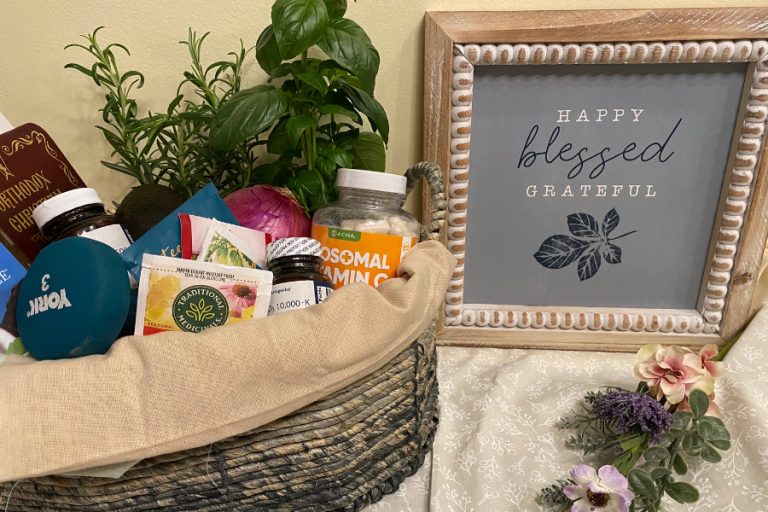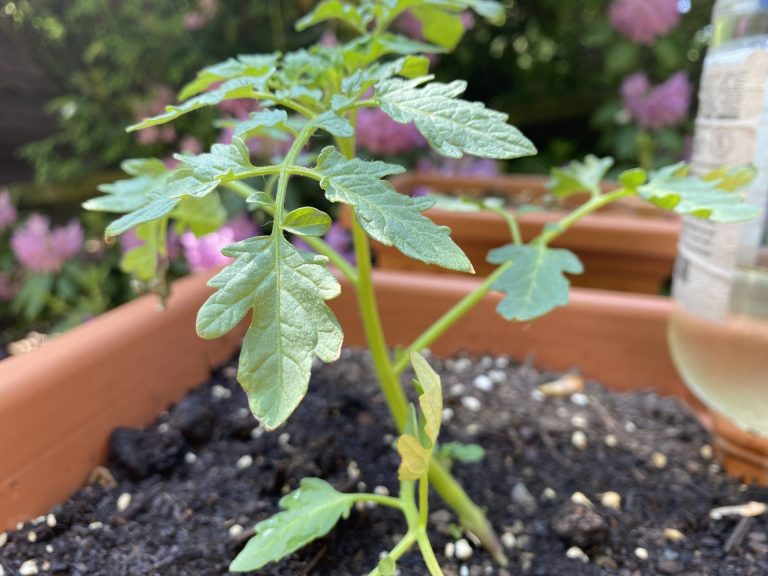October Herb of the Month: Cinnamon
This post may contain affiliate links. View our disclosure policy here.
I love the taste of cinnamon in my tea and in baked dishes during the fall and winter! Lots of people have questions about this October Herb of the Month. For example, do you know if cinnamon is an herb or a spice? Do you wonder what the health benefits of cinnamon are? Do you know about some of the benefits but wonder how much is necessary to make a difference? Keep reading to find out the answer to these questions and more!
Cinnamon is a highly flavorful herb or spice (read below for more on that) that has been used around the world for thousands of years. It is still used medicinally, often daily in many cultures because of the number of benefits it contains, in addition to its distinctly sweet, warming taste!
Is Cinnamon a Spice or an Herb?
The difference between an herb and a spice, believe it or not, can get some culinary buffs and herbalists and others in heated debate.
Some say there is no difference between the two whatsoever. But many insiste there is actually a number of differences.
In general, many sources say spices are more flavorful and are made up of seeds, bark, or the root of a plant, while herbs come from the leaves, flowers, and stems. This definition would make cinnamon a spice.
For my purposes, on My Wellness Basket, any plant worked with for medicinal purposes will be referred to as a medicinal herb. Now let’s keep reading about the health benefits of cinnamon!
Cinnamon: The Herbal Basics
Family: Lauraceae
Latin Name: Cinnamomum cassia (there are other varieties – this post refers to cassia)
Medicinal Parts: inner bark
Energetics: warming, moistening, tonifying
Actions: antimicrobial, aromatic, astringent, demulcent, diffusive, hypoglycemic, mild circulatory stimulant, relaxant
20 Health Benefits of Cinnamon
1. High in Antioxidants
Like most herbs, cinnamon is high in antioxidants. In fact, cinnamon is rated as number one out of 26 of the most popular herbs and spices in the world for its protective antioxidant levels.
The antioxidants in cinnamon work to fight oxidative stress in the body and have been found to assist in the prevention of chronic disease.
2. Anti-inflammatory Effects
The antioxidants and flavonoids in cinnamon can help reduce inflammation which in turn also reduces the risk of such things as cancer, heart disease, diabetes, and skin conditions among others.
3. Pain Management
Because cinnamon lowers swelling and inflammation, it may be beneficial to work with for pain management and relieve sore muscles.
4. Blood Sugar Regulation
Cinnamon is considered a top food or herb for diabetics with good reason. Studies indicate that cinnamon can lower blood sugar levels. These studies demonstrate that the health benefits of cinnamon may block activity of several digestive enzymes, slowing the absorption of sugar in the bloodstream after consuming carbohydrates.
5. Heart Health
Cinnamon has been shown to reduce the risk of several factors contributing to heart disease. The herb appears to lower cholesterol levels, triglyceride levels, and blood pressure.
6. Cognitive Function
Cinnamon may have certain properties that can potentially support brain function including its antioxidant and anti-inflammatory effects.
Additionally, cinnamon may improve blood flow to the brain and has compounds like cinnamic acid, which may have neuroprotective properties that enhances the resilience of brain cells.
Some limited research also indicates that cinnamon may have effects to improve memory and attention. One of my favorite stress teas may be what I reach for next time I feel a need for an attention boost!
7. Antibacterial
Cinnamaldehyde, a key component of cinnamon, has been found to inhibit the growth of various bacteria, including those responsible for foodborne illnesses like Salmonella and Escherichia coli (E. coli). Cinnamon’s antibacterial effects can help reduce the risk of food spoilage and foodborne diseases.
8. Antifungal
Cinnamon exhibits antifungal properties that can inhibit the growth of molds and yeast. It is effective against common food spoilage fungi and can be used to extend the shelf life of baked goods, dairy products, and other perishable foods.
The powerful antifungal properties in cinnamon may also be effective in treating or preventing candida overgrowth in the digestive tract.
9. Antiviral
Some research indicates that cinnamon may have activity against some viruses. It may help inhibit the replication of respiratory viruses and, therefore, may be used as a natural remedy for colds and respiratory infections. Try adding some cinnamon to your tea next time you are fighting a cold! Better yet, try this already made tea bags I just discovered!
10. Antiparasitic
The health benefits of cinnamon include its antiparasitic effects. Cinnamon has shown potential in inhibiting the growth of certain parasites and can be used in traditional medicine for treating parasitic infections.
11. Optimizes Oral Hygiene
Cinnamon’s antimicrobial properties make it common and useful in oral care products like toothpaste and mouthwash. It may help combat bacteria that contribute to bad breath and dental plaque formation. Some herbal sources say it helps to whiten and brighten your teeth as well.
Members of my family also love the cinnamon flavored Zellies Dental Gum, great for oral health!
12. Skin Health
Cinnamon oil has antibiotic and antimicrobial properties which help protect skin from irritation, rashes, allergic reactions and infection. (Always use a carrier oil when working with essential oils).
13. Allergy Relief
Those suffering from allergies may find relief thanks to many beneficial compounds in cinnamon. Cinnamon may reduce these symptoms due to its ability to reduce inflammation as well as fight histamine reactions.
14. Warming
Cinnamon is a warming herb and helps those with feelings of coldness whether due to winter weather or a person that just tends to run cold.
15. Natural Preservative
Cinnamon can act as a food preservative primarily due to its natural antimicrobial and antioxidant properties. For those seeking natural and chemical-free methods of food preservation, cinnamon can be a healthy option.
16. More Cinnamon, Less Sugar
Cinnamon has a natural sweetness to it. Therefore, adding cinnamon to foods and recipes can help you cut down on the amount of sugar you normally use.
Try adding cinnamon to baked goods, yogurt, on fruit or in your oatmeal instead of adding extra sugar. Try cinnamon teas or adding it to coffee (a favorite of mine).This can help you reduce sugar intake and cut down on calories to aid in weight loss and cinnamon’s other health benefits.
17. Nutritive
While it’s not the highest of nutritive herbs by any means, cinnamon does contain fiber, manganese, calcium, vitamin k, and smaller amounts of magnesium, potassium, and other trace minerals and vitamins.
18. Menstrual Cycle Regulation
Cinnamon has been suggested as a natural remedy for menstrual cycle regulation and relief of certain menstrual symptoms. This is due to its anti-inflammatory effects as well as the connection between blood sugar regulation and hormones.
Additionally, cinnamon’s anti-inflammatory and analgesic (pain-relieving) properties may help provide relief from menstrual cramps and discomfort.
19. Respiratory Health
Cinnamon has been traditionally used for its potential respiratory health benefits, primarily due to its antimicrobial, anti-inflammatory, and warming properties.
The antimicrobial properties may inhibit the growth of bacteria and fungi in the respiratory tract, therefor reducing the risk of respiratory infections.
Cinnamon’s warming properties may help to loosen and thin mucus in the airways. This makes it easier to expel mucus and relieve congestion, which is beneficial for conditions like colds, sinusitis, and other respiratory illnesses.
Have you ever wondered why cinnamon is often included in natural remedies for sore throats or coughs? The soothing properties and pleasant taste can often provide relief from coughing and throat irritation.
Some research suggests that cinnamon may have bronchodilatory effects. This means it may help widen the airways and improve airflow. This benefit is useful for individuals with conditions like asthma.
20. Potpourri & Aromatherapy
Cinnamon is a popular and versatile ingredient in potpourri, which is a mixture of dried herbs, flowers, spices, and other fragrant materials used for decorative and aromatic purposes. The warm and inviting scent in potpourri may assist in stress relief, improved concentration, and as a natural insect repellent. The scent of dried cinnamon lasts quite long.
Inhaling the aroma of cinnamon through steam inhalation or aromatherapy may provide a sense of comfort and relaxation, which can help ease respiratory discomfort.
21. Digestive Aid
Cinnamon has astringent, anti-inflammatory, and antimicrobial properties. All of these work together to make cinnamon a great aid in tightening, toning, and healing gut damage, ease diarrhea, and discourage pathogens.
22. Stress Aid
In addition to its aromatherapy effects mentioned above, antioxidants, and blood sugar regulation benefits, the pleasant taste and aroma of cinnamon can have a positive impact on mood. Enjoying cinnamon in foods or beverages may provide a sense of comfort and satisfaction, which can help alleviate stress.
Additionally, cinnamon is known for its digestive benefits, including helping to ease indigestion and stomach discomfort. When the digestive system functions well, it can reduce the physical discomfort that can be associated with stress.
Western herbalists often consider cinnamon as a warming herb that can provide comfort and relaxation. It is believed to have mild sedative effects, which can help reduce stress and anxiety (sedatives in the herbal world are not near as ‘sedating’ as conventional medicines).
Is a Spoonful a Day Good For You?
No one should be consuming a heaping spoonful of cinnamon at once.
Most studies on record have used anywhere between 1/2 teaspoon to 2 teaspoons as a daily intake. This is the amount considered to be medicinal. However, even the 2 teaspoons are not to be taken all at once.
Spread your cinnamon through the day. Include it in baked goods and drinks.
Consuming normal amounts of cinnamon isn’t likely to have a big impact on your health. It’s not a good idea to consume an overabundance of it either.
How Long Does it Take for Cinnamon to Have an Affect on Health?
According to healthline.com, one study showed that those who consumed 1 gram (g) of cinnamon (equal to .36 of a teaspoon) extract daily for 12 weeks, reduced fasting blood sugar levels and also improved markers of oxidative stress in people with type 2 diabetes. Of course, this is extract, not actual cinnamon. These studies drive me nuts sometimes because they don’t always use what you and I would actually work with on a daily basis.
Another source I found stated that cinnamon may take around 4 to 18 weeks to reduce blood sugar and cholesterol levels (https://www.ncbi.nlm.nih.gov/pmc/articles/PMC3767714/)
My personal answer, however, to this common question, is begin to add cinnamon to your daily routine and monitor your own health. All of us are different. You may see a difference in as little as a week or so, or your body may need the medicinal actions to work longer for you to notice. I’d give it a few months before deciding it doesn’t work for you. That’s just my personal opinion of course. I encourage you to work with a functional health practitioner or professional herbalist.
Are There Risks in Taking Too Much Cinnamon?
Cinnamon has a long history of medicinal use. In fact, thousands of years. There is a strong record of safety in clinical studies.
However, there is some concern regarding the levels of coumarin in cassia cinnamon which may lead to liver toxicity in high longer term use. If this is a concern for you, Ceylon cinnamon is lower in coumarins and may be a better choice.
The issues that are more likely to arise out of using cinnamon daily long term however is possible stomach upset or low blood pressure (especially if taking a supplement on an empty stomach)and a bit of constipation (it’s actually quite good for remedying diarrhea).
Please note that studies for medicinal benefits or cautions are based on working with at least 1/2 teaspoon or more daily. Taking higher than recommended doses is where people can run into trouble, experiencing mouth sores, low blood sugar or potential liver issues. Therefore, it’s best to keep intake in moderation, in food rather than high dose supplements, and pair with a healthy diet and active lifestyle to maximize the potential health benefits.
Where to Find Cinnamon
You can find cinnamon in most grocery stores. I suggest buying an organic brand. This is the cinnamon you want for adding to baked goods or even to add a few dashes to your coffee at home. However, if you want a great quality of cinnamon for making your own herbal teas, infused honeys, or other concoctions, you may want to check out the following sources.
Cinnamon
Mountain Rose Herbs – Mountain Rose has a great selection of cinnamon and cinnamon products. Check out these cinnamon chips that are easy to add to your own herbal blend for tea!
Monterey Bay Herb Co is a great source for organic herbs. I’ve only begun ordering from them over the past year and I’ve been very pleased with the herbs and their prices. Check out their cinnamon collection.
Amazon has some good finds as well. My husband and I have purchased our cinnamon sticks from this company through Amazon.
Simply Organics is a favorite organic spice of mine which you will find in my kitchen. Just in case your local grocery store doesn’t carry organic spices, here’s a link to the one I usually use.
Cinnamon Teas

Try out Earthley’s Spice Tea! Earthley is a wonderful company and has several products to offer containing cinnamon.
Organic India has teas on Amazon. I love their tulsi teas. I’ve written about tulsi here. Check out this delightful tulsi cinnamon rose tea!
The Republic of Tea This one will be in my cupboard for the fall and winter months!
Strictly Medicinal This tea company is pretty amazing. Definitely a favorite of mine! Check out the stress ease tea!
Recipes for the Health Benefits of Cinnamon
Cinnamon Milk
My son loves this recipe! It’s a simple, delicious recipe that is nice to warm the body, aid in digestion, and may also help if someone is experiencing loose bowels. Or, just make it becuase it’s delicious.
Heat about 1 cup milk in a pan. Add 1 teaspoon powdered cinnamon with a teaspoon of honey (you may want to add the honey after the milk cools to keep more of raw honey’s natural benefits).
Let cool to desired temperature. Enjoy.
Cinnamon Tulsi Rose Tea
You can buy the teabags if you are a teabag kind of person. Or you can make your own if you enjoy working with your own herbs and experiment with flavors and amounts. Here’s a simple recipe you can make or tweak for your own pleasure!
- 1 tsp cinnamon chips
- 1 tsp tulsi (Holy Basil)
- 1 tsp rose buds/petals
Place the herbs in a steeping basket over a mug or mason jar. Pour 10-12 oz hot water over the herbs. Cover to steep for 10-20 minutes. Add honey if desired after steeping (to preserve the benefits of the honey). Enjoy.
Other Recipe Links You May Enjoy:
Classicbakes.com has a nice cinnamon tea recipe.
Our Gabled Home has a delightful cookie recipe I want to try!
The Herbal Benefits of Cinnamon: Conclusion
Adding cinnamon to your daily routine in baking, teas, coffee, and perhaps as an occasional supplement comes with a long list of benefits, including assistance to blood sugar control, oral hygiene, reduced inflammation and an added bonus of helping with stress.
Working with cinnamon is definitely beneficial but you do want to be sure to stay within a medicinal range while not overdoing it which could have potential for harm rather than help.
My recommendation, for the health benefits of cinnamon, is to increase whatever your normal use is by a half teaspoon to one teaspoon a day, closely monitoring your goals and looking for any negative side effects. Again, I recommend, as I always do, in working with a functional medicine provider or a professional herbalist.
Other Herbal Posts You May Enjoy!
Herb of the Month: The Lovely Rose
The Health Benefits of Chamomile Tea









This is a very thorough post on cinnamon and how it can help you medicinally. Thanks for posting this information! I didn’t realize just how helpful cinnamon is for the body.
Thanks for reading! I try to be thorough. There’s so much more to herbs than people realize! Hope you can start incorporating it and other herbs more in your daily routines!
Cinnamon is one of my favorite spices – I think it can be used with all kinds of food and drinks. Because who doesn’t like cinnamon? Cinnamon with chicken is a real game-changer!!! And all its good qualities, how it helps the body, how it warms up on cool days! A spice that must be treated like a real queen.
It’s been a long while since I tried it with chicken. I just may go looking for a new recipe!
Very interesting, I had no idea cinnamon could do so much!
I do like to reach out and let people know how amazing these herbs/spices are!
I love cinnamon, but I didn’t know it had so many health benefits. I think I’ll try to add some cinnamon to baking and morning oatmeal. Thank you for an inspirational article.
That’s a great idea! And if a recipe calls for it, there’s no harm in adding some extra!
I LOVE cinnamon. I recently started using the Ceylon kind bc it has a little more kick.
Most find Ceylon to be more sweet and delicate in flavor. So that’s interesting and shows that our taste buds do respond differently to flavors, don’t they? Some studies show Ceylon to have a little more medicinal benefits but in general they are very similar. Thanks for sharing!
I love cinnamon!!! Thank you for all these benefits, I had no idea!
It’s amazing that something so tasty can be so amazingly beneficial too!